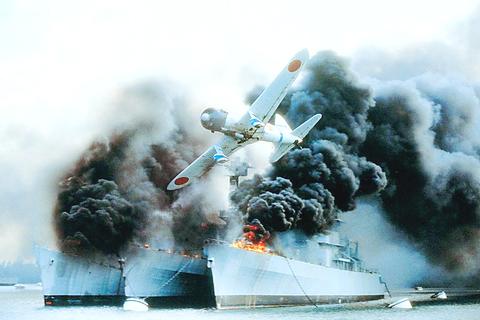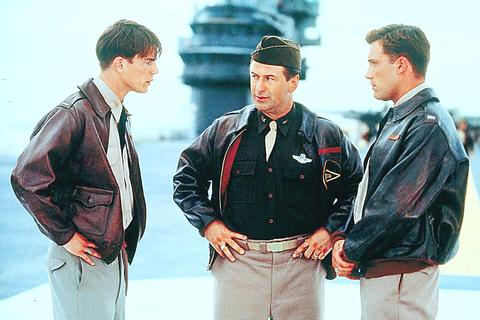The surnames Bruckheimer and Bay are warning enough that Pearl Harbor is not going to be a film of ideas. Having been put through The Rock and Armageddon, former collaborations, not to mention the intensive barrage of media hype, we know to expect lots of bang for our cinema buck. And to be perfectly fair, Pearl Harbor delivers. The bombing sequences are stunning, but sitting through the adolescent love story that precedes it and the self-congratulatory smugness that pervades it, are a high price to pay.
The opening sequence, a crop-duster returning home in the light of a perfect sunset, two wide-eyed children watching it across wide fields, establishes the tone of the film -- it has all the realism and emotional punch of a scenic calendar. The cast is also full of beautiful people, who, despite considerable talent, remain beautiful cardboard cutouts completely incapable of producing emotional resonance. This is unfortunate, because Pearl Harbor has a cast of highly talented actors, but fails to let them shine. It almost seems that the director is impatient with mere mortals, and anything that is not on some epic Hollywood scale of grandeur and technical complexity cannot be tolerated for a moment.

PHOTO: UNIVERSAL
Anything as dull as history is put firmly in its place, with Bay spending an hour or so developing a romance between ace flyboy Ben Affleck and Kate Beckinsale, who both do yeoman's work with the thin, clunky material they are provided with. Josh Hartnett, the best friend, is waiting in the wings ready to be incorporated into a turgid love triangle. The emotional trauma is so glib that there is a feeling of relief when the bombing begins -- at least at this point you feel the director is finally in his element.

PHOTO: UNIVERSAL
The bomb's-eye view of the USS Arizona's demise has already been repeated to the point of satiety in the movie's trailers, but it is a credit to the film's technical crew that despite this, extended sequences of the attack are still spellbinding. The massiveness of the ships and the bombs that tear them apart has a gut-wrenching intensity that love and betrayal among the main characters never achieves.
It is only unfortunate that Bay cannot leave well enough alone, and the need for the two best friends to replay the aerial acrobatics of Luke Skywalker going up against the defenses of the Death Star is particularly trying. At the simplest level, this is because you've seen this sort of thing before -- although certainly not with such technical refinery -- but also because it comes across too much like a paean to the "free-wheeling spirit of the great American people." Consider the stiff-upper-lipped RAF officer who spouts lines like, "If there are many more back home like you, God help anyone who goes to war with America." The RAF officer isn't given any more lines, let alone a character. The national stereotyping is also applied to the Japanese.
Attempts are made not to demonize the Japanese, but these are rather half-hearted, and sometimes seem to have rather the reverse effect. As the Japanese prepare for their attack, a voiceover tells us the feelings of a Japanese pilot heading into action which parrots the cliche of Japanese who are happy to die for their country at the drop of a hat. Rather than humanizing the foe, this succeeds merely in reducing them to blips on a screen.
Cuba Gooding Jr also plays a kind of blip on the screen as the black man who is given a few lines and a bit of action as a nod to racial integration in the US navy. Although the story deals with a historical character who was decorated for heroism, Gooding's role is so small and contextually isolated as to be little better than patronizing.
Even in portraying the horrifying losses on the US side, Pearl Harbor rarely attains any visceral impact. In the way that the Pearl Harbor base seems to be filled with nice clean-cut boys and girls, the carnage also has a packaged quality that keeps any real human response at bay. Underwater shots of torpedoes shooting through the thrashing legs of drowning sailors are quite brilliant -- so brilliant, in fact, that you forget that any real human suffering was involved. The few moments of real intensity, and they do occur, are over so quickly that you scarcely notice them.
The love-triangle, on the other hand, is something you are never allowed to get away from. The fact that war will be used as a way of resolving the problem can be guessed at from a very early stage, rather dampening the dramatic tension.
The final section of the film provides a kind of moral victory for the Americans with a bombing of Tokyo. Unsurprisingly, this is portrayed from the US point of view, and is more about the heroic US bombing mission dodging vicious anti-aircraft fire and defensive swarms of fighters. The element of vengeance, which one can only presume is the motive for the mission, is played down.
For local audiences, there is one moment of humor, although it cannot have been intended that way by the filmmakers. Colonel James Doolittle, played by Alec Baldwin, gets to tell his flyers to say "Wo shi mei guo ren" (I am an American, in Mandarin), in preparation for a landing in China. It is a phrase that seems to sum up the intrinsically self-regarding nature of a film, which sees history -- when it bothers with history at all - -- from a narrow perspective of America as the "leader of the free world."
Film Notes:
Pearl Harbor
Directed By: Michael Bay
Runnign Time: 183 minutes
Rated: PG
Starring: Ben Affleck (Rafe Mccawley), Josh Hartnett (Danny Walker), Kate Beckinsale (Evelyn Johnson), Jon Voight (President franklin D. Roosevelt), Cuba Gooding JR. (Dorie Miller), Dan Aykroyd (Captain Thurman).

June 9 to June 15 A photo of two men riding trendy high-wheel Penny-Farthing bicycles past a Qing Dynasty gate aptly captures the essence of Taipei in 1897 — a newly colonized city on the cusp of great change. The Japanese began making significant modifications to the cityscape in 1899, tearing down Qing-era structures, widening boulevards and installing Western-style infrastructure and buildings. The photographer, Minosuke Imamura, only spent a year in Taiwan as a cartographer for the governor-general’s office, but he left behind a treasure trove of 130 images showing life at the onset of Japanese rule, spanning July 1897 to

One of the most important gripes that Taiwanese have about the Democratic Progressive Party (DPP) is that it has failed to deliver concretely on higher wages, housing prices and other bread-and-butter issues. The parallel complaint is that the DPP cares only about glamor issues, such as removing markers of Chinese Nationalist Party (KMT) colonialism by renaming them, or what the KMT codes as “de-Sinification.” Once again, as a critical election looms, the DPP is presenting evidence for that charge. The KMT was quick to jump on the recent proposal of the Ministry of the Interior (MOI) to rename roads that symbolize

On the evening of June 1, Control Yuan Secretary-General Lee Chun-yi (李俊俋) apologized and resigned in disgrace. His crime was instructing his driver to use a Control Yuan vehicle to transport his dog to a pet grooming salon. The Control Yuan is the government branch that investigates, audits and impeaches government officials for, among other things, misuse of government funds, so his misuse of a government vehicle was highly inappropriate. If this story were told to anyone living in the golden era of swaggering gangsters, flashy nouveau riche businessmen, and corrupt “black gold” politics of the 1980s and 1990s, they would have laughed.

It was just before 6am on a sunny November morning and I could hardly contain my excitement as I arrived at the wharf where I would catch the boat to one of Penghu’s most difficult-to-access islands, a trip that had been on my list for nearly a decade. Little did I know, my dream would soon be crushed. Unsure about which boat was heading to Huayu (花嶼), I found someone who appeared to be a local and asked if this was the right place to wait. “Oh, the boat to Huayu’s been canceled today,” she told me. I couldn’t believe my ears. Surely,